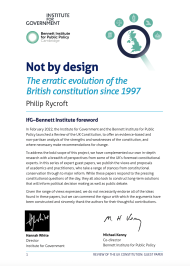
Philip Rycroft, the former permanent secretary at the Department for Exiting the European Union, has written a new guest paper for the Institute for Government and Cambridge University’s Bennett Institute calling on responsible politicians from all parties to transform political culture and commit to a consistent, long-term approach to constitutional reform.
The report warns that decades of failure to manage constitutional change has left the UK system teetering on the edge of legitimacy. The ramshackle nature of the British constitution may not be a direct driver of popular discontent, but there is evidence that the democratic fabric is wearing thin as trust in politics and politicians plumbs new depths.
Rycroft’s paper, which sets out six proposals for reforming the way in which constitutional change is managed, argues that a lack of capacity in government to see the constitution within a long-term timeframe is coupled with weak incentives on political actors to place short term political gain above long-term constitutional coherence. While most governments have failed to prioritise a coherent set of reforms, Rycroft argues that Boris Johnson’s government was “not sensitive to the niceties of constitutional convention” and chipped away at confidence in the constitutional framework.
He also that warns that even since Johnson’s resignation, there has “been no groundswell of opinion within the governing party to reverse the constitutional distortions that were the hallmark of his time in office. For example, the Northern Ireland Protocol Bill, a piece of legislation that would explicitly lead to the UK reneging on its international commitments, passed its House of Commons stages despite Johnson’s resignation.”
Philip Rycroft’s six proposals to develop the expectation that governments, and parliament in general, will approach constitutional matters through a more self-reflective and publicly consultative route, are to:
- Raise the political bar on changes to core constitutional statute by, for example, require, a two thirds majority in the House of Commons for repeal or amendment to constitutional law.
- Give a reformed second chamber a role as guardian of the constitution. The chamber might also have powers to refer the government to the Supreme Court if it deemed that core constitutional norms were at risk of being breached.
- Put the Cabinet Manual on a statutory basis. The aim would be to codify convention and make clearer when governments are approaching a line that precedent previously guarded.
- Create an independent extra-parliamentary body to advise on constitutional issues. Such a body could serve as a constitutional ‘conscience’ for the government, political parties and civil service.
- Strengthen understanding of the UK constitution in the civil service, with a permanent constitutional secretariat established in the Cabinet Office.
- Build consent for change through meaningful public engagement.
Philip Rycroft’s guest paper forms part of a major review of the UK constitution by the Institute for Government and Bennett Institute for Public Policy to improve the way that government works.
He is a former senior civil servant with more than 30 years’ experience in UK government, including roles advising ministers on the constitution and leading preparations for the 2014 Scottish independence and then 2016 EU referendums.




